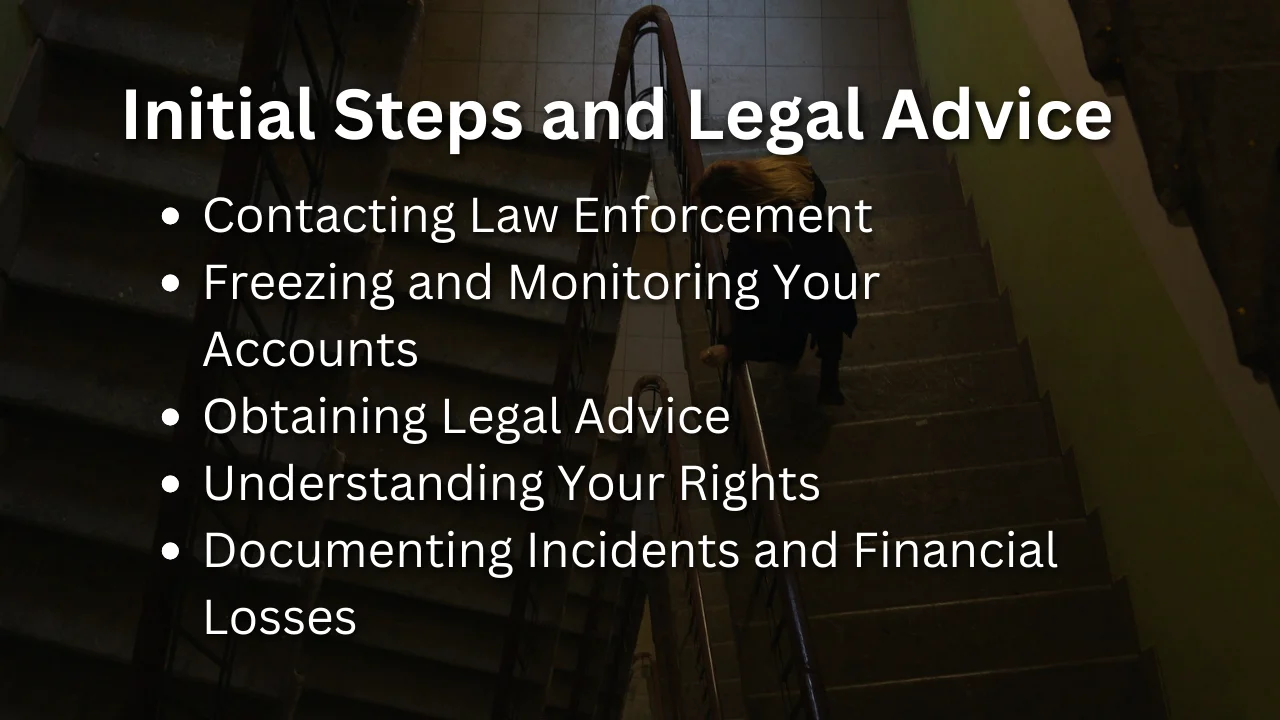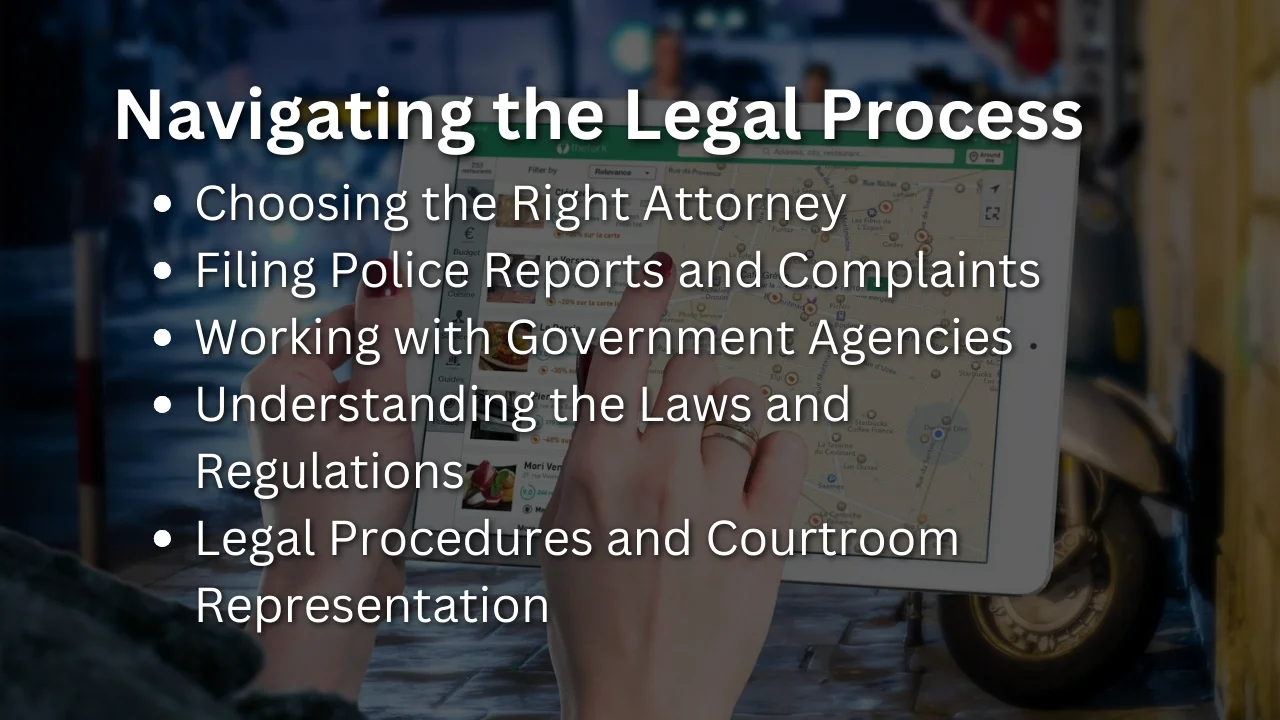You may not realize it, but identity theft can happen to anyone, at any time. When your personal information falls into the wrong hands, it can lead to devastating consequences for your finances, credit score, and overall peace of mind. That’s where attorneys for identity theft come in. These legal professionals specialize in navigating the complex world of identity theft, providing the knowledge and expertise needed to protect your rights and assist you in recovering from the aftermath.
From investigating the source of the theft to negotiating with credit agencies and pursuing legal action if necessary, attorneys can be your strongest ally in the fight against identity theft.

Getting Legal Assistance for Identity Theft
Understanding the Role of Attorneys
When it comes to dealing with identity theft, attorneys can be valuable allies. They have the legal expertise and knowledge to guide you through the complex and often overwhelming process of resolving identity theft issues. Attorneys specializing in identity theft understand the intricacies of the law and can provide you with essential advice and representation throughout the journey.
They can assist you in understanding your rights, documenting incidents, investigating and building a strong case against the culprits, navigating the legal process, restoring your identity and credit, recovering financial losses, resolving criminal charges, and preventing future identity theft.
Why You Need an Attorney
Identity theft can have severe and long-lasting consequences, affecting not only your finances but also your reputation and overall well-being. In such cases, it is crucial to have an attorney by your side to protect your rights and fight on your behalf. Attorneys specializing in identity theft have the knowledge and expertise to navigate the legal complexities involved in these cases.
They can provide you with invaluable guidance throughout the process, ensuring that you take the necessary steps to recover your identity, mitigate financial losses, and pursue justice against the responsible individuals. With an attorney by your side, you can have peace of mind knowing that you have a legal advocate fighting for your interests.
Initial Steps and Legal Advice
Contacting Law Enforcement
As soon as you discover that you have become a victim of identity theft, one of the initial steps you should take is to contact law enforcement. This involves reporting the incident to your local police department or the appropriate law enforcement agency in your jurisdiction.
By filing a police report, you establish an official record of identity theft, which can be crucial when dealing with creditors, financial institutions, and other parties involved. The police report will also help initiate the investigation process and potentially lead to the identification and prosecution of the identity thief.
Freezing and Monitoring Your Accounts
While working with law enforcement, it is crucial to take immediate action to protect yourself from further harm. One of the first steps is to freeze your accounts and monitor them closely. By freezing your accounts, you prevent any unauthorized access and transactions, adding an extra layer of security. Additionally, regularly monitoring your accounts allows you to detect any suspicious activity and take swift action if needed.
Obtaining Legal Advice
Identity theft cases can be complex, involving various legal considerations and potential consequences. Seeking legal advice from an attorney experienced in handling such cases is highly recommended. A knowledgeable attorney can assess your situation, provide guidance on the legal implications, and help you understand your rights throughout the process.
They can also advise you on appropriate actions to take to secure your accounts, initiate an investigation, and gather evidence, providing you with peace of mind and a clear path forward.
Understanding Your Rights
When facing identity theft, it is crucial to be aware of your rights as a victim. Your attorney can help you understand these rights, including your rights under federal and state identity theft laws, consumer protection laws, and other relevant regulations.
Knowing your rights will empower you to make informed decisions, take appropriate actions, and seek legal remedies. Your attorney can help ensure that your rights are protected throughout the legal process, advocating for you and fighting for the justice you deserve.
Documenting Incidents and Financial Losses
Documenting incidents and financial losses is essential when pursuing a legal case against identity thieves. Your attorney can guide you in properly documenting and organizing the evidence required to build a strong case. This includes keeping a record of all fraudulent transactions, communication with creditors and financial institutions, police reports, and any other relevant documents. By having a well-documented case, you increase your chances of success when seeking restitution and holding the responsible parties accountable.

Investigating and Resolving Identity Theft
Assessing the Extent of the Theft
Once you have reported the identity theft to law enforcement and sought legal advice, it is crucial to assess the extent of the theft. Your attorney can assist you in understanding the full scope of the identity theft, including the impact on your finances, credit history, and personal information. This assessment will guide your efforts in recovering your identity and resolving the situation effectively.
Gathering Evidence
To build a strong case against the identity thief, gathering evidence is vital. Your attorney will help you identify the types of evidence that will be most compelling and admissible in court. This may include financial records, communication exchanges with creditors and financial institutions, surveillance footage, and any other relevant documentation. By working closely with your attorney, you can ensure that all necessary evidence is collected and properly documented, strengthening your case.
Working with Investigators
Identity theft cases often involve cooperation with various investigators, including law enforcement agencies and private investigators. Your attorney can act as a liaison between you and the investigators, ensuring that your interests are protected throughout the process.
They can help coordinate efforts, provide necessary information, and ensure that the investigation is conducted efficiently and effectively. By working hand in hand with investigators, you increase the chances of identifying the culprit and achieving a favorable resolution.
Identifying the Culprit
Identifying the individual or individuals responsible for the identity theft can be a challenging task. However, with the assistance of investigators and legal professionals, the chances of identifying the culprit significantly improve. Attorneys specializing in identity theft have the knowledge and resources to conduct thorough investigations, leveraging their connections with law enforcement agencies and other relevant entities. They can help uncover vital information and evidence to lead to the identification and apprehension of the identity thief.
Building a Strong Case
A strong case is crucial in dealing with identity theft. Your attorney will work tirelessly to build a solid case against the identity thief, gathering evidence, organizing documentation, and crafting legal strategies. They will leverage their knowledge of identity theft laws and regulations to ensure that your case is strong and compelling.
With a strong case, you enhance your chances of achieving a favorable outcome, whether it’s seeking restitution, recovering financial losses, or holding the identity thief accountable.
Navigating the Legal Process
Choosing the Right Attorney
The choice of attorney is critical when navigating the legal process of identity theft. It is essential to select an attorney with experience and expertise in handling identity theft cases specifically. Look for attorneys who have a proven track record of success in similar cases and who are knowledgeable about the laws and regulations governing identity theft. A skilled attorney can provide the guidance and representation you need to navigate the legal complexities successfully.
Filing Police Reports and Complaints
Working closely with your attorney, you will file police reports and complaints against the identity thief. These reports serve as official records of the crime and are crucial for initiating investigations and legal proceedings. Your attorney will ensure that all necessary information is included in these reports and that they are submitted to the appropriate law enforcement agencies or entities promptly.
Working with Government Agencies
Identity theft cases often involve collaboration with government agencies, such as the Federal Trade Commission (FTC) and the Social Security Administration (SSA). Your attorney will guide you through the process of working with these agencies, ensuring that you comply with the necessary requirements and deadlines. They will assist you in submitting the required documentation, responding to inquiries, and resolving any issues that may arise during interactions with government agencies.
Understanding the Laws and Regulations
Identity theft laws and regulations can vary at the federal, state, and international levels. Your attorney will ensure that you have a comprehensive understanding of the relevant laws and regulations governing your specific case. This understanding will enable you to make informed decisions, take appropriate actions, and protect your rights effectively.
Your attorney will also stay updated on any changes or updates to the laws and regulations, ensuring that your legal strategies align with the most current standards.
Legal Procedures and Courtroom Representation
Throughout the legal process, your attorney will guide you through the various legal procedures involved. This includes court filings, hearings, negotiations, and any other necessary legal actions. If your case goes to court, your attorney will provide vigorous courtroom representation, presenting your case persuasively and advocating for your rights and interests. Having an experienced attorney by your side ensures that you have competent legal representation throughout the process, increasing your chances of a successful outcome.

Restoring Your Identity and Credit
Correcting Your Credit Reports
Identity theft can wreak havoc on your credit reports, resulting in inaccurate and damaging information. Your attorney can assist you in correcting these inaccuracies and restoring your credit. They will work with credit reporting agencies, creditors, and other relevant entities to dispute fraudulent information and ensure that your credit reports reflect accurate and positive information.
Challenging Fraudulent Accounts
Identity theft often involves the opening of fraudulent accounts in your name. Your attorney will help you navigate the process of challenging these fraudulent accounts and removing them from your record. This may involve working with creditors, financial institutions, and credit reporting agencies to provide evidence of fraudulent activity and request the removal of these accounts from your credit history.
Recovering Stolen Funds
In cases where financial losses have occurred due to identity theft, your attorney will assist you in pursuing the recovery of stolen funds. They can help you gather evidence of unauthorized transactions, work with financial institutions, and explore legal avenues for restitution. With their expertise in financial matters and the legal system, they can guide you in seeking compensation for the financial losses you have suffered.
Dealing with Unauthorized Transactions
Identity theft often involves unauthorized transactions, such as fraudulent purchases or withdrawals. Your attorney will provide guidance on how to deal with these unauthorized transactions, including reporting them to the appropriate financial institutions and contesting the charges. They will assist you in navigating the process of recovering the funds lost due to these unauthorized transactions and seeking reimbursement for any resulting damages.
Protecting Your Future
Identity theft can have long-term consequences that extend beyond the immediate resolution of the case. Your attorney will work with you to develop strategies for protecting your future from the repercussions of identity theft. This may include implementing security measures to safeguard your personal information, educating yourself about identity theft risks, and utilizing legal tools and resources to prevent future incidents. With the guidance of your attorney, you can take proactive steps to protect yourself and minimize the chances of falling victim to identity theft again.
Recovering Financial Losses
Determining the Extent of Your Losses
Recovering financial losses resulting from identity theft requires a comprehensive assessment of the extent of the damages. Your attorney will work with you to determine the exact amount of financial losses you have incurred. This includes reviewing your financial records, credit reports, and any other relevant documents to identify unauthorized transactions and quantify the damages. By accurately assessing your losses, you can pursue the appropriate legal remedies and seek compensation accordingly.
Pursuing Insurance Claims
In some cases, insurance policies may provide coverage for losses resulting from identity theft. Your attorney can help you navigate the process of filing insurance claims and seeking reimbursement for the financial damages you have suffered. They will guide you in understanding the terms and conditions of your insurance policy, gathering the necessary documentation, and presenting a strong case to your insurance provider. With their expertise in insurance matters, they can increase your chances of a successful claim.
Suing Identity Thieves
In certain situations, suing identity thieves may be a viable option for recovering financial losses. Your attorney will assess the circumstances of your case and advise you on whether filing a civil lawsuit against the identity thief is appropriate. They will guide you through the legal procedures involved in suing the identity thief, including filing the lawsuit, gathering evidence, and presenting your case in court. With their legal expertise, they can help you seek justice and potentially obtain financial compensation for the damages you have suffered.
Seeking Restitution
Restitution is another legal avenue for recovering financial losses resulting from identity theft. Your attorney will explore the possibility of seeking restitution from the identity thief as part of the criminal prosecution process. They will work with law enforcement agencies and prosecutors to ensure that your financial losses are considered during the pursuit of criminal charges. Seeking restitution can be an effective way to hold the identity thief accountable and recover some or all of the financial damages inflicted upon you.
Resolving Criminal Charges
Defending Against False Charges
Identity theft can sometimes result in false criminal charges being brought against you. If you find yourself in this situation, it is crucial to have the support and expertise of an attorney who can defend your innocence. Your attorney will thoroughly investigate the circumstances surrounding the false charges, gather evidence to support your defense, and present a compelling case to ensure that your innocence is proven.
Proving Your Innocence
Proving your innocence in an identity theft case requires a strategic and detailed defense approach. Your attorney will review all the evidence against you, identify any inconsistencies or weaknesses, and build a strong defense strategy. They will thoroughly investigate the case, gather evidence, interview witnesses, and present arguments that support your innocence. With their expertise in criminal defense, they will fight tirelessly to prove your innocence and protect your rights.
Navigating the Criminal Justice System
Navigating the complex and often intimidating criminal justice system is challenging, especially when facing false criminal charges. Your attorney will guide you through the various stages of the criminal proceedings, ensuring that you understand your rights and the potential consequences.
They will prepare you for court appearances, help you navigate interactions with prosecutors and law enforcement, and provide the necessary legal representation to achieve the best outcome possible. With their experience and knowledge of the criminal justice system, they will work to protect your rights and mitigate the impact of the false charges.
Handling Identity Theft in Different Scenarios
Identity Theft in the Workplace
Identity theft can also occur in the workplace, with serious implications for both employees and employers. If you experience identity theft in the workplace, it is essential to seek legal assistance. Your attorney can help you understand your rights as an employee, assist in reporting the incident to appropriate authorities and government agencies, and pursue legal action against the identity thief. They can also guide employers in implementing measures to prevent and address identity theft within their organizations.
Identity Theft in the Digital World
In today’s digitally connected world, identity theft has become increasingly prevalent in cyberspace. If you fall victim to identity theft in the digital realm, it is crucial to seek legal assistance to navigate the unique challenges of these cases. Your attorney can work with technology experts to identify the methods used by the identity thief, advise you on strengthening your digital security, and assist in pursuing legal action against the perpetrator. They can also guide you in dealing with online platforms, financial institutions, and law enforcement agencies during the resolution process.
Child Identity Theft
Child identity theft is a particularly distressing form of identity theft that can have long-lasting effects. Your attorney can help you navigate the specific challenges associated with child identity theft, such as discovering the theft, reporting the incident, and restoring your child’s identity. They can work with relevant agencies and institutions, such as credit reporting agencies and financial institutions, to correct inaccurate information and protect your child’s future.
Tax Identity Theft
Tax identity theft occurs when someone uses your personal information to falsely file tax returns or claim refunds. This can lead to significant financial and legal consequences. Seeking legal assistance when dealing with tax identity theft is essential. Your attorney will guide you through the process of reporting the theft to the IRS, resolving any disputes or issues related to your tax records, and protecting your rights during tax investigations.
Medical Identity Theft
Medical identity theft involves the unauthorized use of your personal information for medical purposes, such as obtaining medical treatment or prescription drugs in your name. This can lead to serious medical and financial consequences. Your attorney can help you navigate the unique challenges of medical identity theft, including reporting the theft to healthcare providers, disputing false medical records, and addressing any resulting financial issues. They can also work with insurance companies and healthcare organizations to ensure accurate information and protect your rights as a victim of medical identity theft.

Preventing Future Identity Theft
Educating Yourself about Identity Theft Risks
Prevention is key when it comes to identity theft. Educating yourself about the risks and common tactics used by identity thieves is an essential first step in protecting yourself. Your attorney can provide valuable information and resources to help you understand the latest identity theft trends, phishing schemes, and security vulnerabilities. By staying informed, you can take proactive measures to safeguard your personal information and minimize the risk of future identity theft incidents.
Strengthening Security Measures
Taking proactive steps to strengthen your security measures is crucial in preventing identity theft. Your attorney can provide guidance on implementing robust security measures, such as creating strong and unique passwords, enabling two-factor authentication, and regularly updating your security software.
They can also advise you on securing your physical documents and sensitive information, such as Social Security cards, passports, and financial statements. By adopting these security practices, you enhance your protection against identity theft.
Regularly Monitoring Your Accounts
Regularly monitoring your accounts is an effective way to identify and respond to potential identity theft incidents promptly. Your attorney can advise you on the best practices for monitoring your accounts, such as reviewing bank statements, credit reports, and financial transactions regularly. They can also guide you in utilizing credit monitoring services and identity theft protection programs to stay vigilant and detect any suspicious activity before it escalates.
Guarding Personal Information
Protecting your personal information is crucial in preventing identity theft. Your attorney can provide guidance on safeguarding your personal information by minimizing its exposure and ensuring secure storage. They can advise you on sharing personal information only with trusted parties, being cautious when providing information online, and securely disposing of sensitive documents. By adopting these practices, you make it harder for identity thieves to access and misuse your personal information.
Using Legal Measures to Protect Identity
Legal measures can serve as additional layers of protection against identity theft. Your attorney can help you explore legal tools and resources available, such as credit freezes, fraud alerts, and identity theft protection services. They can advise you on the benefits and limitations of these measures and assist you in taking the necessary steps to implement them effectively. By utilizing legal measures, you add an extra level of protection to your identity and increase your chances of preventing identity theft.
Understanding Identity Theft Laws and Regulations
Federal Identity Theft Laws
Identity theft is a crime that falls under federal jurisdiction, and there are specific laws in place to address this issue. Your attorney will help you understand the federal identity theft laws applicable to your case. These laws include the Identity Theft and Assumption Deterrence Act (ITADA) and the Identity Theft Penalty Enhancement Act (ITPEA). Understanding these laws will ensure that your legal strategies align with federal requirements and provide you with the necessary guidance for pursuing justice.
State Identity Theft Laws
In addition to federal laws, each state has its own set of identity theft laws that govern cases occurring within its jurisdiction. Your attorney will be familiar with the identity theft laws specific to your state and will guide you in understanding their nuances and requirements. They will ensure that your legal strategies align with state laws, maximizing your chances of a successful outcome and helping you seek justice under the appropriate legal framework.
Regulations and Standards
Various regulations and standards exist to protect individuals and organizations from identity theft. Your attorney will help you navigate these regulations and standards, including those set forth by government agencies and industry bodies. This may include compliance with regulations such as the Gramm-Leach-Bliley Act (GLBA) or the Health Insurance Portability and Accountability Act (HIPAA), depending on your specific circumstances. Adhering to these regulations and standards will help you protect your personal information and minimize the risk of identity theft.
International Perspectives on Identity Theft
Identity theft is not restricted to any particular country or region. With the global nature of identity theft, international perspectives and cooperation are crucial in addressing this issue effectively. Your attorney can provide insights into international laws, regulations, and best practices related to identity theft. They will ensure that your legal strategies consider international implications and align with the relevant legal frameworks. By understanding the international landscape, you can take a more holistic approach to protecting your identity and pursuing justice.
In conclusion, dealing with identity theft can be a complex and overwhelming process. However, with the help of an experienced attorney, you can navigate the legal landscape, protect your rights, and seek a resolution. Attorneys specializing in identity theft can guide you through the initial steps, investigate the theft, navigate the legal process, and assist in restoring your identity and recovering financial losses.
They can also help you handle identity theft in various scenarios, prevent future incidents, and ensure compliance with identity theft laws and regulations. With an attorney by your side, you can take control of your situation and work towards reclaiming your identity and securing your future. Remember, you don’t have to face identity theft alone – reach out to an attorney for the assistance and support you need.










